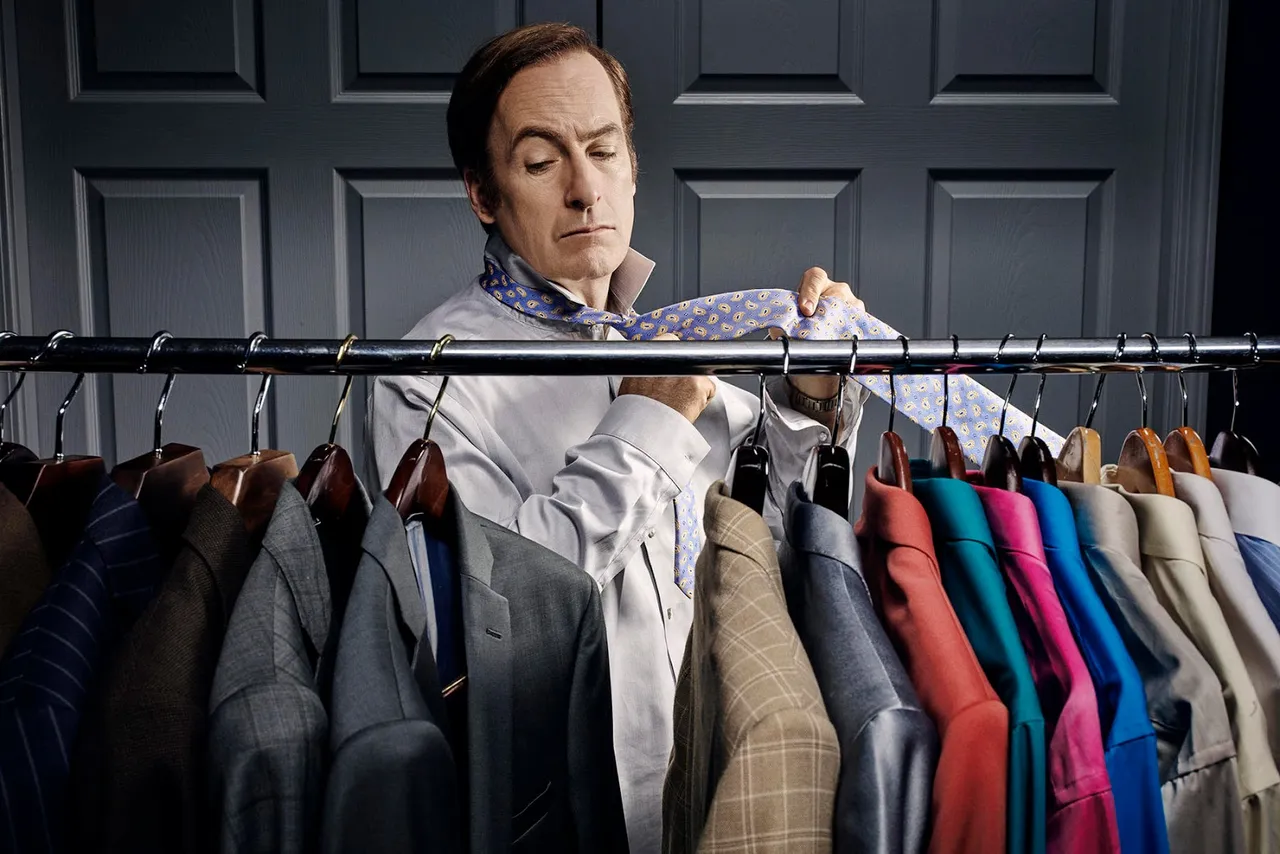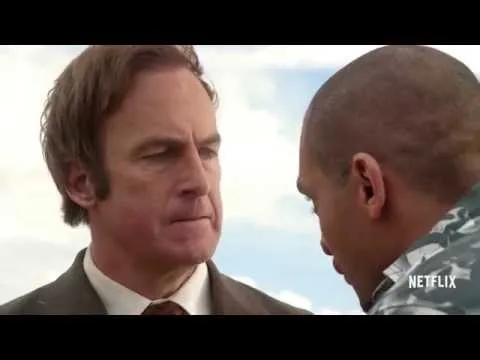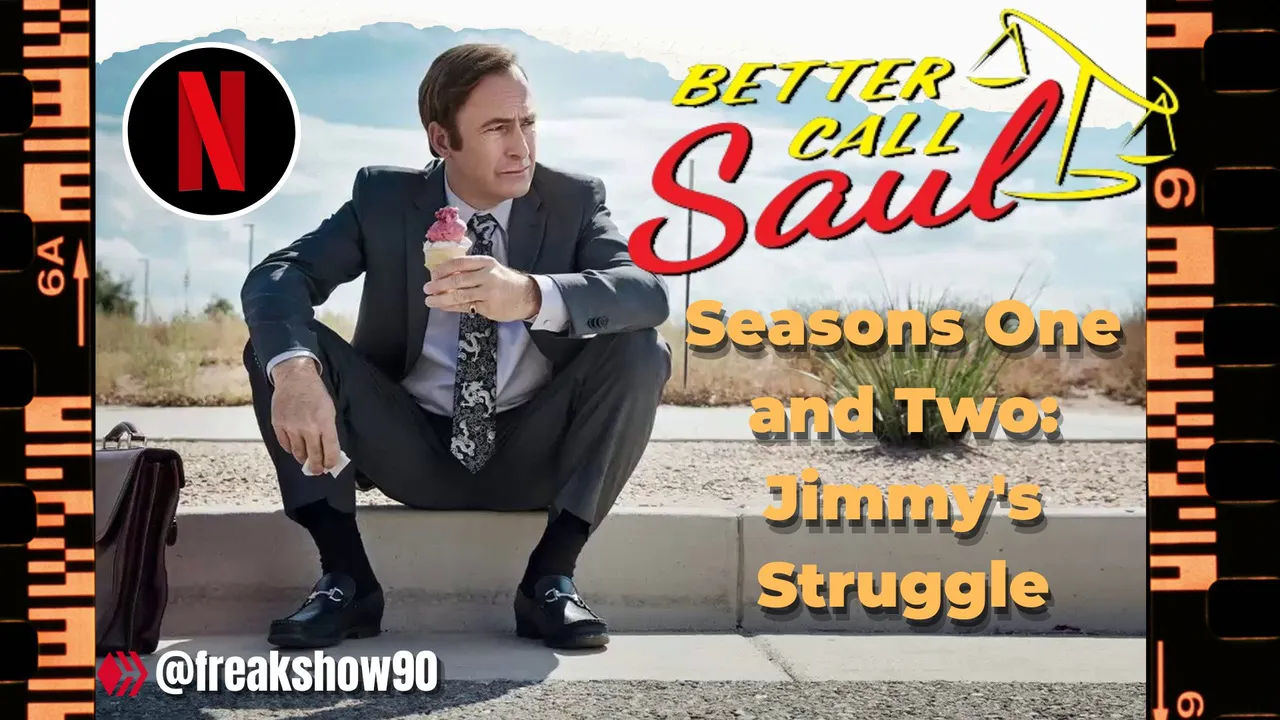
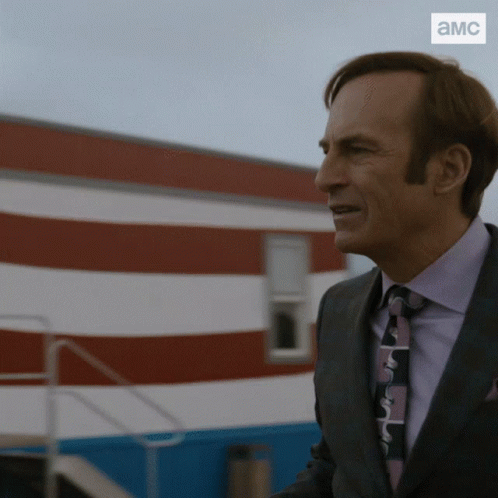
Vince Gilligan and Peter Gould, writers, scriptwriters and creators of a series of characters that will be in the history of cinema and audiovisual creation for dozens of years from the making of "Breaking Bad" to "Better Call Saul", probably did not foresee the success they would have with the talent they had... What do I mean by that? Well, in particular, as far as I'm concerned, I can't find any notable flaws, within a plot that shows a human being full of flaws and virtues, like any other like him. Who struggles, who tries to be better, but at the same time hides (represses) the essence that always lived inside him. This is the story (in the first two seasons) of Jimmy McGill. Also known as "Saul Goodman" or "Charlie Hustle"...
Vince Gilligan y Peter Gould, escritores, guionistas y creadores, de una serie de personajes que estarán en la historia del cine y de la creación audiovisual, por decenas de años desde la realización de "Breaking Bad", hasta "Better Call Saul"; probablemente no previeron el éxito que tendrían con el talento que tenían... ¿Qué quiero decir con esto? Bueno, en lo particular, en lo que respecta a mí, no puedo hallar fallos destacables, dentro de una trama que muestra a un ser humano repleto de defectos y virtudes, como cualquier otro igual a él. Que lucha, que intenta ser mejor, pero que al mismo tiempo esconde (reprime) la esencia que siempre habitó dentro de él. Esta es la historia (en las primeras dos temporadas) de Jimmy McGill. También conocido como "Saul Goodman" o "Charlie Hustle"...
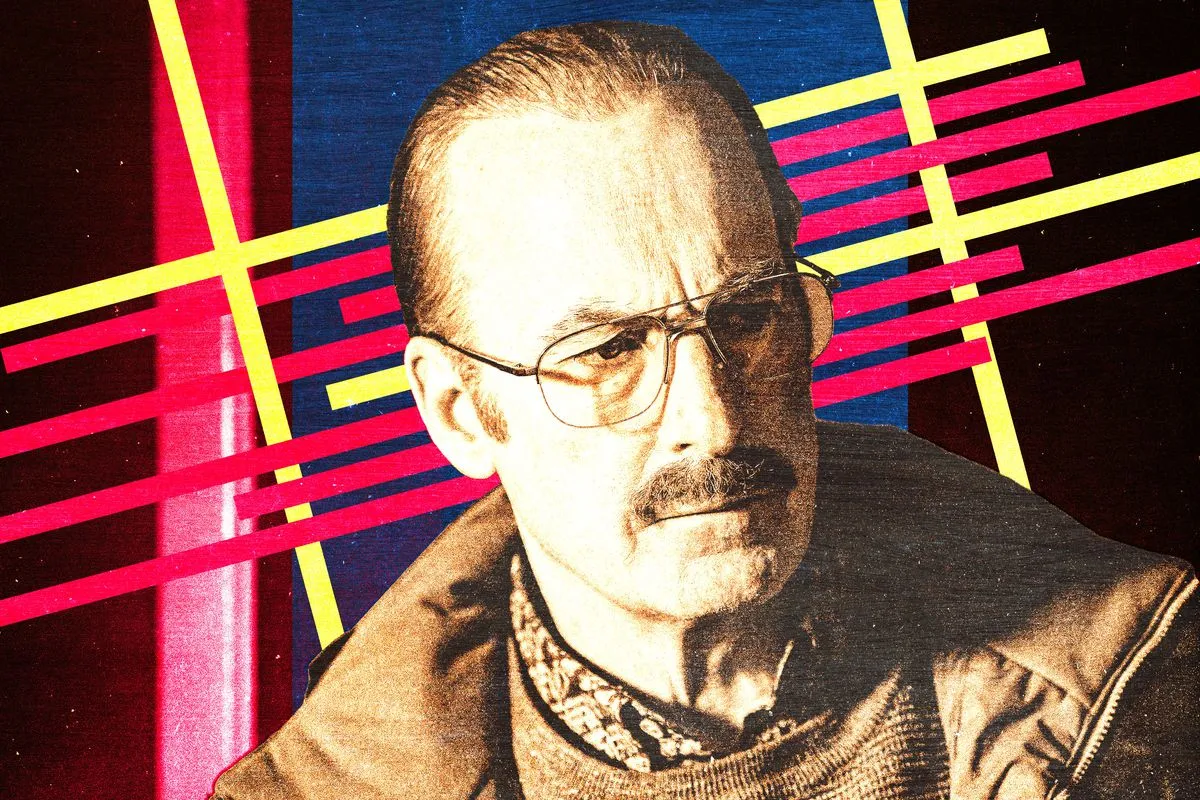
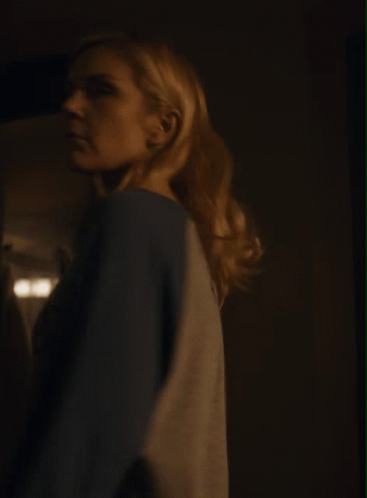
If there is one thing that this series (Better Call Saul) has achieved, it is to show how naturally human beings are usually corrupt. Obviously, there are resources that make the story more bearable, archetypes that are once again reinforced, in a rather negative way, such as the legal profession. However, this does not mean that the underlying character behind the character lacks substance. On the contrary, if you ask me, I could tell you that it is precisely this distinctly twisted sense of survival, of struggle, that drives each and every one of us to get out of our beds. Some may do so more morally than others. Of that, I am sure. But Jimmy McGill is a character who, if there's one thing he knows, it's how to fight and fight.
Those who have seen the show, the series produced by AMC, distributed by Netflix and Sony Pictures, will know that "Saul Goodman" is a character who makes his first appearance in Breaking Bad, as a lawyer who promotes himself through TV commercials with little production, yellowish and with that classic alarmist and distressing tone of mass advertising in the United States. This is how the universe created by Vince Gilligan came to be seen by all of us who follow it, and seconded by the creation of the spin-off, which brings us here today to do this review. Now, how could we describe this character in a way that is both justice-related and accurate? I don't have the slightest idea, but I do know one thing, I'm going to express my opinion and I think you'll like it.
Si hay algo que ha logrado esta serie (Better Call Saul) es demostrar la naturalidad con la que los seres humanos, usualmente somos corruptos. Obviamente, hay recursos que hacen que la historia sea más llevadera, arquetipos que una vez más se refuerzan, de manera bastante negativa, como la profesión de abogado. Sin embargo, no por esto, el carácter subyacente que hay detrás del personaje carece de sustancia. Al contrario, si me preguntan a mí, podría decirles que es precisamente este marcado sentido retorcido de supervivencia, de lucha, es lo que nos impulsa a todos y cada uno de nosotros a levantarnos de nuestras camas. Algunos, podrán hacerlo con mayor moral que otros. De eso, estoy seguro. Pero Jimmy McGill es un personaje que si algo sabe, es luchar y luchar.
Quienes han visto el show, la serie producida por AMC, distribuida por Netflix y Sony Pictures, sabrán que "Saul Goodman" es un personaje que hace su primera aparición en Breaking Bad, como un abogado que se promociona a sí misma a través de comerciales para televisión con poca producción, amarillista y con ese clásico tono alarmista y angustiante de la publicidad de masas en los Estados Unidos. Así, llega a la vista de todos lo que seguimos el universo creado por Vince Gilligan, y secundado por la creación del spin off, el cual nos trae hoy aquí para hacer esta reseña. Ahora bien, ¿cómo podríamos describir a ese personaje de un modo que guarde relación con la justicia, y al mismo tiempo, sea acertado? No tengo la menor idea, pero algo sí sé, voy a expresar mi parecer y creo que gustará.
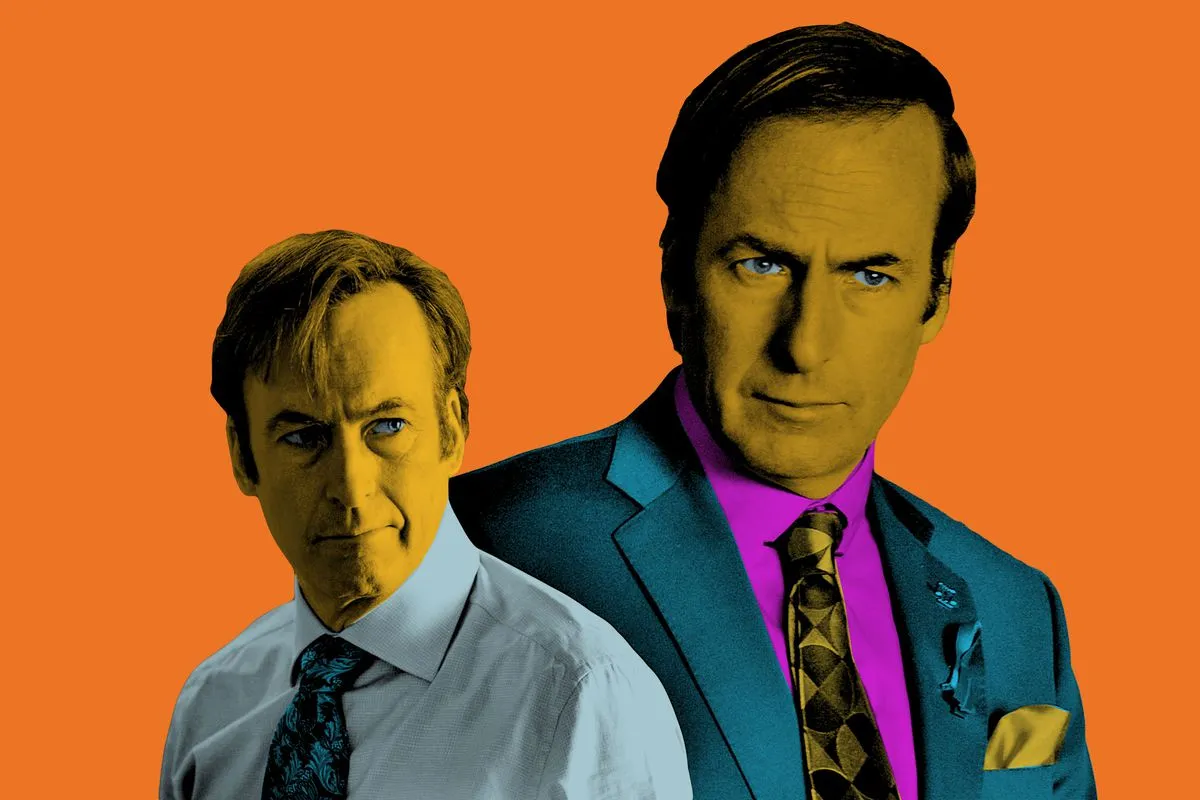
Being the younger brother of a total of two (men, no sisters), and at the same time possessing a personality in conflict with the established law, customs and morals of the time, is something that surely marked Jimmy's psyche. His older brother, much older than him, is a prominent lawyer, with his own firm. Successful, the pride of Cicero, Chicago, Illinois. Charles McGill, better known as "Chuck", is someone who takes deep pride in having paddled through all the difficulties life threw at him. With an unalterable sense of morals and professional ethics he has made a name, a reputation, a way of life. Quite simply, the opposite and different face of his little brother; Jimmy, our protagonist.
Y es que, ser el hermano menor, de un total de dos (hombres, sin hermanas), al mismo tiempo poseer una personalidad conflictiva con lo establecido por la ley, costumbres y moral de la época, es algo que seguramente marcó la psique de Jimmy. Su hermano mayor, bastante más grande que él, es un prominente abogado, con su propia firma. Exitoso, el orgullo de Cicero, Chicago, Illinois. Charles McGill, mejor conocido como "Chuck", es alguien que siente un profundo orgullo por haber remado todas las dificultades que la vida le puso. Con un sentido inalterable de la moral y la ética profesional ha hecho un nombre, una reputación, un estilo de vida. Sencillamente, la cara opuesta y distinta de su hermanito; Jimmy, nuestro protagonista.
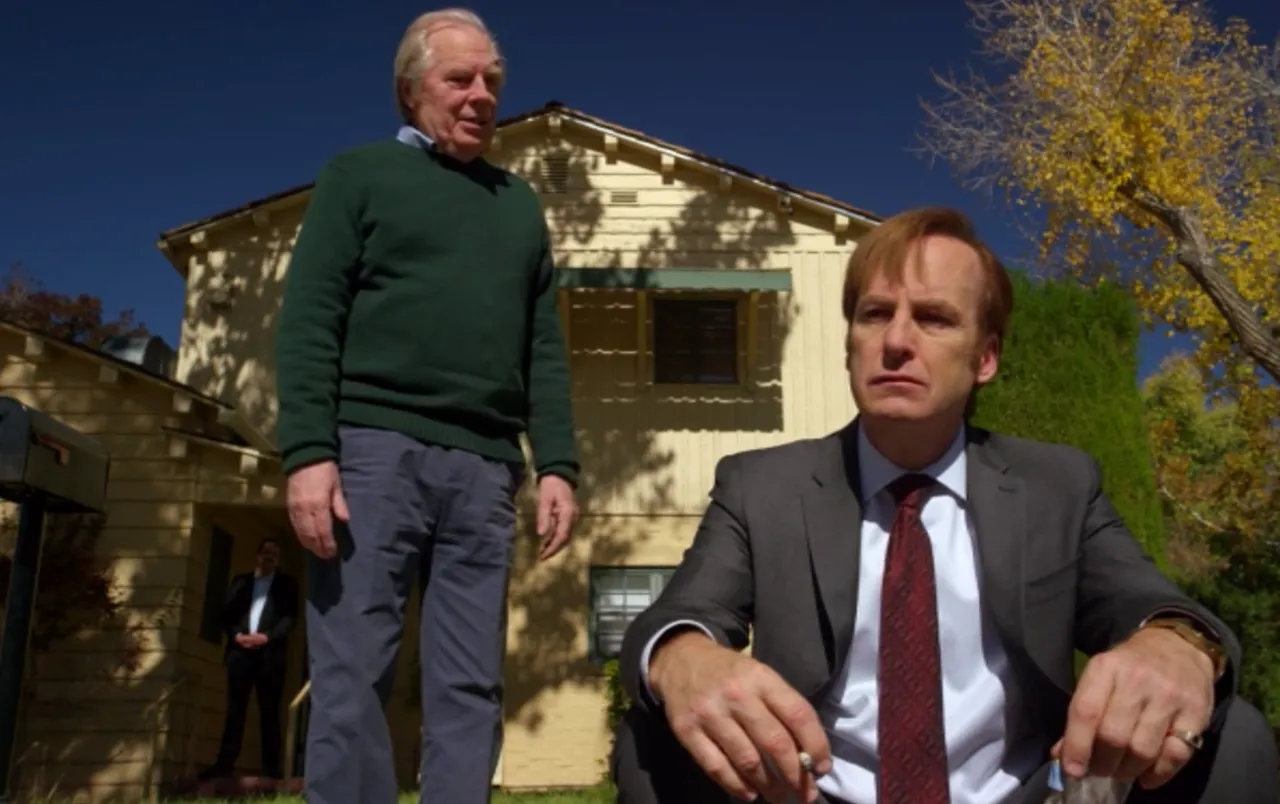
You see, James McGill is the younger of the two. The one who always had problems with the meaning of authority, of good manners. A boy, who from an early age learned to "take shortcuts" to find success. Like "Chuck", he grew up with a devoted father, and a mother who loved them. But he, being much younger than his older brother, lived more with his father in his father's shop in his hometown of Cicero, Chicago. Jimmy's father, who had a nobility that is hard to argue with, was too good a guy for a world full of people who spot such people and take advantage of them. Jimmy learned this, and it shaped his life. It's what gives the show meaning; the "why" of the personality of the later Saul Goodman.
That said, the yearning to be "good" enough in the eyes of Chuck, his brother, pervades Jimmy's mind, and in a way haunts him. Clearly, this is not the main plot, but they are relevant psychological aspects to understand the things that happen to him when he executes the tricks that characterise him and give the show meaning. Let's not forget, nothing comes out of nowhere, and for those who have followed any character created by Gilligan, they will know this to be true. There is complexity, and it could not be less so in the case involving both brothers. Jimmy earned a law degree from "American Samoa University", according to the series, a small-time school. By mail, and without telling anyone. He worked for years at his older brother's firm, in the mailroom.
Verán, James McGill, es el menor de los dos. El que siempre mantuvo problemas con el significado de la autoridad, de las buenas costumbres. Un chico, que desde muy temprana edad aprendió a "tomar atajos" para hallar el éxito. Al igual que "Chuck", creció con un padre devoto, y una madre que los amaba. Pero él, al ser mucho más joven que su hermano mayor, convive más con su padre en la tienda que éste último tenía en su ciudad natal, Cicero, Chicago. El padre de Jimmy, tenía una nobleza difícil de discutir, era un sujeto demasiado bueno para un mundo repleto de personas que detectan a estas personas y se aprovechan de ellas. Esto lo aprendió Jimmy, y marcó su vida. Es lo que da sentido al show; el "por qué" de la personalidad de quien luego sería Saul Goodman.
Dicho esto, el anhelo por ser suficientemente "bueno" ante los ojos de Chuck, su hermano, invade la mente de Jimmy, y de cierto modo le obsesiona. Claramente, esta no es la trama principal, pero sí son aspectos psicológicos relevantes para entender las cosas que le suceden cuando ejecuta las tretas que le caracterizan y que le da sentido al show. No olvidemos, que nada surge de la nada, y para quien han seguido cualquier personaje creado por Gilligan, darán que esta verdad. Existe complejidad, y no podía ser menos en el caso que involucra a ambos hermanos. Jimmy logró un título de grado en abogacía en la "American Samoa University", según la serie, una escuela de poca monta. Por correo, y sin decirle a nadie. Trabajó por años en la firma de su hermano mayor, en el área de correo.
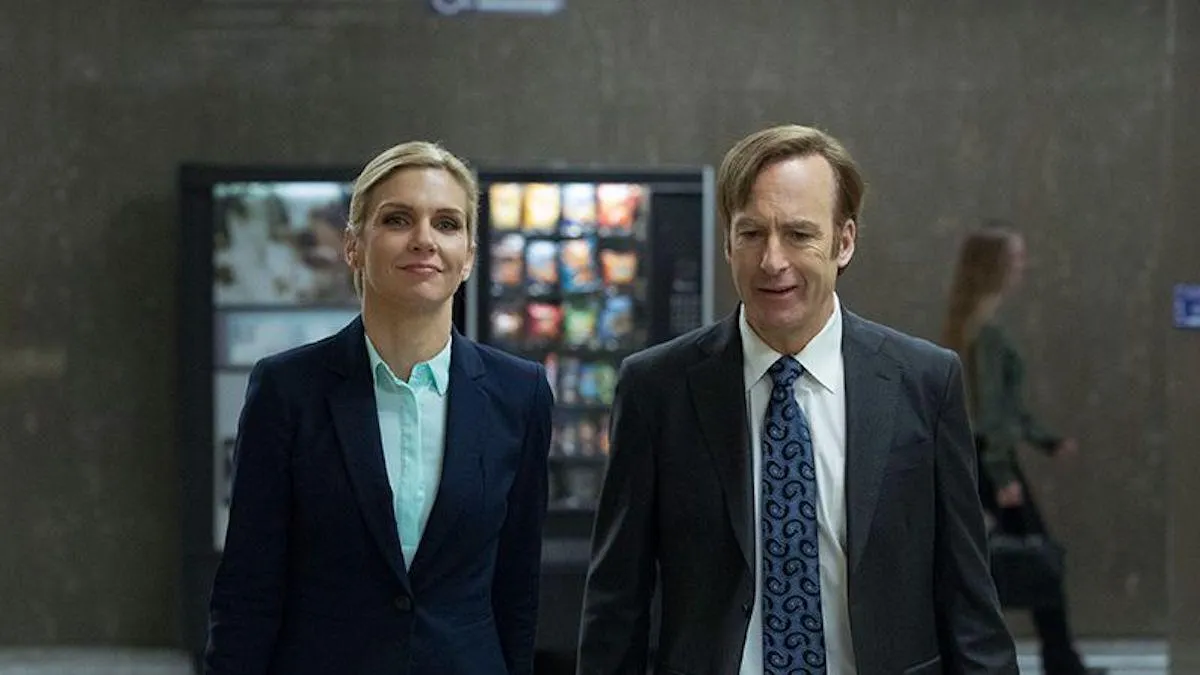
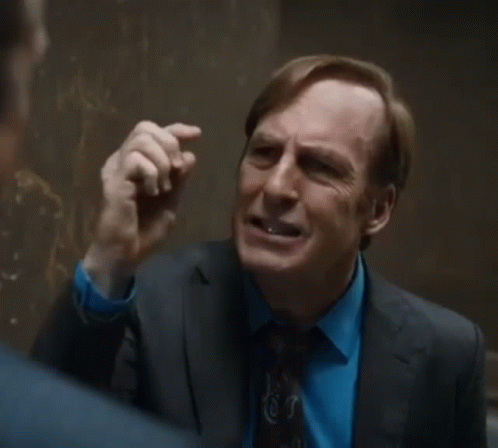
Life did not smile much on Jimmy, as he was always underestimated and above all, rejected and confronted as an outcast for having made mistakes in his youth. "The Slippery Jimmy" was the name he was known by in those days. He would scam and defraud people by throwing himself into their windows, feigning damage from the crash and collecting money as a function of "not suing them". He was in and out of prison for extortion, until one day his brother released him but with the decisive condition that he would change or else he would have to face the legal consequences: prison. This precipitated "his retirement" from the activity at which he was good, very good, and which repressed him for years. Obviously, this behaviour did not disappear, but it is what gives the character a stage and a justification to later imitate his brother (to be a lawyer, just like him) and start earning a living as a "responsible adult".
La vida, no le sonrió mucho a Jimmy, pues siempre fue subestimado y sobre todo, rechazado y confrontado como un paria por haber cometido errores en su juventud. "The Slippery Jimmy" era el nombre por el que era conocido en aquellos días. Timaba y defrauda a las personas, al arrojarse en su vidrios, fingir un daño por el choque y cobrar dinero en función de "no demandarlos". Entraba y salía de las reclusiones por extorsión, hasta que un día su hermano lo liberó pero con la determinante condición que cambiara o sino tendría que afrontar las consecuencias legales: prisión. Ésto precipitó "su retiro" de la actividad en la cual era bueno, muy bueno, y le reprimió por años. Evidentemente, no desapareció esa conducta pero es lo que le da un escenario y una justificación al personaje para luego, imitar a su hermano (ser abogado, igual que él) y empezar a ganarse la vida como todo un "adulto responsable".
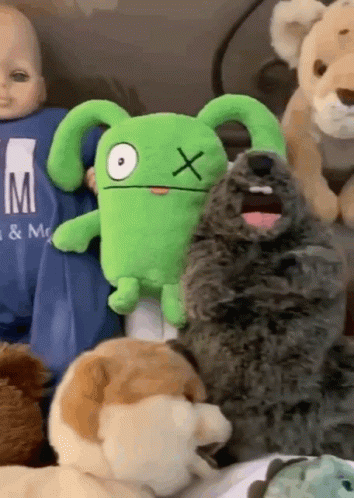
He soon discovers that life is far more complicated than he can tolerate. To make matters worse, his brother comes down with a controversial condition called "electromagnetic hypersensitivity". Which, within the logic of the series, is treated as a clear and undoubted symptom of mental illness or post-traumatic stress due to Chuck's break-up with his ex-wife, Rebecca (but that's another story...). He fights in the public courts for money that barely keeps him afloat, with limitations and full of failures. The girl he's always loved only sees him as entertainment, not a possible long-term relationship, and to top it all off; his brother rants at him every chance he gets. "I'm proud of you, Jimmy," he tells her, but he never feels it as such.
So, as you can see, life is neither as simple nor as complicated as they thought it was. One thing we can see, spectacularly in the first two seasons of Better Call Saul, is the development of a personality; the why of the tricks and the deceptions. An approximation of what we already know is the inevitable end result, which we can observe and witness in Breaking Bad. Let's not forget that this series is a spin-off, and as such, it is designed to understand how the character of Saul Goodman Attorney At Law was created. And as is undeniable, the construction of the character's psyche, of the decisions he will later have to face, has a genesis; a beginning, and it is here where we see them and can empathise or repel him (Jimmy McGill) but without a doubt, we cannot forget that he is as human as any of us. Despite, oddly enough, being a fictional character, he feels quite real.
Pronto descubre que la vida es muchísimo más complicada de lo que él puede tolerar. Para colmo, su hermano enfermó de una condición bastante controvertida "Hipersensibilidad electromagnética". Que dentro de la lógica de la serie, es tratada como una síntoma claro e indudable de enfermedad mental o estrés postraumático a causa de la ruptura sentimental de Chuck con su ex esposa, Rebecca (pero ésa es otra historia...). Lucha en los juzgados de corte públicos por un dinero que a duras penas lo mantiene a flote, con limitaciones y lleno de fracasos. La chica a la que ama desde siempre, solo lo ve como un entretenimiento, no como una posible relación duradera, y para colmo; su hermano despotrica de él cada vez que puede. "Estoy orgulloso de ti, Jimmy", le dice, pero jamás lo siente como tal.
Así que, como pueden ver, la vida no es ni tan sencilla, ni tan complicada como creían que era. Algo que podremos apreciar, espectacularmente en las primeras dos temporadas de Better Call Saul, es el desarrollo de una personalidad; el porqué de las tretas y los engaños. Una aproximación a lo que ya sabemos es el resultado final e inevitable, que podemos observar y presenciar en Breaking Bad. No olvidemos que esta serie es un spin off, y como tal, está pensado para entender cómo se creó el personaje de Saul Goodman Attorney At Law. Y como es innegable, la construcción de la psique del personaje, de las decisiones que luego tendrá que enfrentar, tiene una génesis; un comienzo, y es aquí donde las vemos y podemos empatizar o repelerlo (a Jimmy McGill) pero sin lugar a dudas, no podemos obviar que es tan humano como cualquier de nosotros. A pesar, curiosamente, de ser un personaje ficticio, lo sentimos bastante real.
